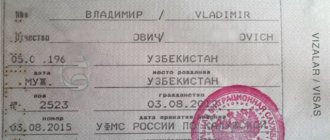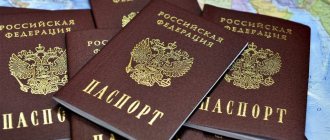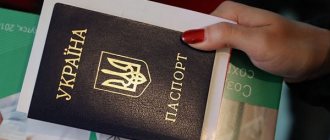The legal status of foreigners in our country is regulated by Law No. 115-FZ[1]. In paragraph 1 of Art. 2 of this document defines the options for the legal status of foreigners. This:
- foreign citizens permanently residing in the Russian Federation - persons who have received a residence permit;
- foreign citizens temporarily residing in the Russian Federation - persons who have received a temporary residence permit;
- foreign citizens temporarily staying in the Russian Federation - persons who arrived in the country on the basis of a visa or on a visa-free basis and received a migration card, but do not have a residence permit or temporary residence permit.
The peculiarities of concluding employment contracts with foreigners temporarily staying in the Russian Federation will be discussed in this material.
About foreigners arriving from countries participating in the Treaty on the EAEU
the Treaty on the EAEU , signed by the Republic of Belarus, the Republic of Kazakhstan and the Russian Federation,
came into force Later they were joined by the Republic of Armenia (from 01/02/2015) and the Kyrgyz Republic (from 08/12/2015). Within the framework of this agreement, freedom of movement of goods, services, capital and labor is ensured. According to Art. 97 of the Treaty on the EAEU , workers of the states party to this treaty are not required to obtain permission to carry out labor activities in the state of employment ( clause 1 ). Their labor activity is regulated by the legislation of the state of employment, taking into account the provisions of the specified agreement ( clause 4 ).
Thus, from the beginning of 2015, organizations hiring citizens of Belarus, Kazakhstan, Armenia (for Kyrgyzstan - from 08/12/2015) must remember that the contract with them is concluded according to the general rules provided for by the Labor Code of the Russian Federation (similar to the rules established for the admission for the work of Russian citizens). Foreigners arriving from countries party to the EAEU Treaty are not required to obtain a work permit or patent in Russia.
To hire an employee with a residence permit, you do not need a permit
- To the employer
How to hire migrants without consequences for the company: experts talk about outstaffing services
- Elena Voropaeva
- 03.07.2020
“We don’t have permission to employ migrants,” is a phrase that probably every second permanent resident foreigner who tried to get a job in a Russian company heard. If you hear something similar, be sure to inform the company representative that according to the law, no permits are required to receive a person with a residence permit. The company does not need to issue any documents for a foreigner with a residence permit beyond the standard set of papers provided for by the Russian Labor Code.
If you don’t take my word for it, take a printout of the law, namely Part 4 of Article 13 of Federal Law-115 “On the Legal Status...” . The regulation clearly states: in order to employ a migrant who has a residence permit, additional permits are not needed. According to the same provision of the law, a foreigner with a residence permit does not need to apply for a patent and a work permit is also no longer required.
Excerpt from part 4 of article 13 of Federal Law-115 “On the legal status...”
Admission with a residence permit occurs in the same way as employment of citizens of the Russian Federation and the employer does not risk anything.
About work permits for foreigners from “visa” countries
According to Art. 18 of Law No. 115-FZ , in order for a foreigner to obtain a work visa, the inviting party (usually the employer) issues an invitation to enter for the purpose of carrying out work activities and pays a state fee. Such an invitation is issued by the Federal Migration Service of Russia or its territorial body within the quota established annually by the Government of the Russian Federation ( clause 1 ). Moreover, by virtue of clause 8 , an employer who has invited a foreign citizen to the Russian Federation for the purpose of carrying out work activities is obliged, in particular: to have permission to attract and use the labor of foreign workers;
ensure that a foreign citizen obtains a work permit; submit the documents necessary for registration of a foreigner at the place of stay in the Russian Federation. We note that based on the provisions of paragraph. 6 tbsp. 327.3 of the Tax Code of the Russian Federation, an employer may enter into an agreement with a foreigner before receiving a work permit. This opportunity is provided for cases where a concluded employment contract is necessary to obtain permission. Then the employment contract will come into force no earlier than the day the permit is received, and information about it will be entered directly into the text of the contract on the basis of Part 3 of Art. 57 Labor Code of the Russian Federation .
In accordance with paragraph 7 of Art. 15.1 of Law No. 115-FZ , a foreign citizen who has received a work permit and arrived in the Russian Federation on the basis of a visa is obliged, within 30 calendar days from the date of issuance of the permit, to submit to the territorial body of the Federal Migration Service a document confirming the citizen’s proficiency in the Russian language and his knowledge of the history of Russia and fundamentals of the legislation of the Russian Federation[5]. If such a requirement is not met, then on the basis of clause 9.1-1 of Art. 18 of Law No. 115-FZ, the work permit is revoked.
About patents for foreigners from “visa-free” countries
If a foreign citizen arrived on the territory of the Russian Federation on a visa-free basis, then the document confirming his right to temporarily carry out labor activities on the territory of the Russian Federation will be a patent .
Until 2015, under the patent system, foreign citizens worked only for individuals, performing work or providing services for personal, household and other similar needs not related to business activities. From this year, on the basis of a patent, a foreign citizen from a “visa-free” country has the right to work for both individuals and legal entities and individual entrepreneurs[6].
Let us note that organizations and individual entrepreneurs have the right to employ foreigners if, at the time of concluding an employment or civil law contract with them, they do not have unfulfilled decisions imposing administrative penalties for illegally recruiting foreign citizens to work in the Russian Federation.
According to paragraph 2 of Art. 13.3 of Law No. 115-FZ , in order to obtain a patent, a foreign citizen, within 30 calendar days from the date of entry into the Russian Federation from a “visa-free” country, must contact the territorial body of the FMS and submit a package of documents listed in this norm. If a foreigner submits these documents after 30 calendar days from the date of entry into the country, he will have to pay a fine of 10,000 to 15,000 rubles. ( Article 18.20 of the Code of Administrative Offenses of the Russian Federation ) and attach a document confirming payment of the fine.
The territorial body of the FMS, no later than 10 working days from the date of acceptance of the foreigner’s application, is obliged to issue him a patent (or a notice of refusal to issue it).
Based on clause 6 of Art. 13.3 of Law No. 115-FZ , when receiving a patent, a foreign citizen presents a document that identifies him, as well as a document confirming the payment of personal income tax in the form of a fixed advance payment[7] for the period of validity of the patent.
For your information
A patent is issued to a foreign citizen for a period of 1 to 12 months ( Clause 5, Article 13.3 of Law No. 115-FZ ). In this case, the validity period of the patent can be repeatedly extended for a period of 1 month. The total validity period, including extensions, cannot be more than 12 months from the date of issue of the patent.
The validity period of a patent is considered extended for the period for which personal income tax is paid in the form of a fixed advance payment. In this case, contacting the territorial bodies of the FMS is not required. Otherwise, the patent expires on the day following the last day of the period for which personal income tax was paid in the form of a fixed advance payment.
The patent form was approved by Order of the Federal Migration Service of Russia dated December 8, 2014 No. 638 . Note 1 to this form states that if a foreigner intends to work for a legal entity or individual entrepreneur, the patent, as a rule, is issued on a blue form, if for an individual, then it is red.
As a general rule, the patent does not indicate the profession (specialty, position, type of work activity) of the foreign citizen. However, as follows from the provisions of paragraph 29 of Art. 13.3 of Law No. 115-FZ , the highest official of a constituent entity of the Russian Federation has the right to decide to indicate the listed information in the patent, about which he informs the territorial body of the FMS.
Thus, if such rules are established in the territory of the subject of the Russian Federation where the organization operates, then the foreign worker must work in accordance with the entry in his patent. If there is a need to change profession (type of activity), the employee should contact the Federal Migration Service to make changes to the information contained in the patent ( Clause 15, Article 13.3 of Law No. 115-FZ ).
So, a foreigner who arrived in the Russian Federation on a visa-free basis, when applying for a job, comes to the employer with a ready-made patent; the procedure for acquiring this document does not concern the organization. If a foreigner has brought a patent, it means that his migration card, health certificate, and documents on knowledge of the Russian language are in order (that is, those documents that he submits to the migration service to obtain a patent; in their absence, he would not have been able to obtain patent).
There is no need to notify the Ministry of Internal Affairs about changes in the employment contract
Labor legislation also applies to foreign workers. An employer using the labor of such workers is obliged to notify internal affairs bodies about the conclusion and termination of employment contracts with them. And there is no need to notify about changes in conditions, including the assignment of other work or a change in the address of its implementation. Therefore, there is no reason to fine for this failure to notify.
Restrictions on the labor of foreigners
A foreign citizen is recognized as a person who has the citizenship of a foreign state and does not have Russian citizenship.
A foreign worker is a foreign citizen temporarily residing in the Russian Federation and carrying out labor activities in accordance with the established procedure (Clause 1, Article 2 of Law No. 115-FZ of July 25, 2002 “On the Legal Status of Foreign Citizens”, hereinafter referred to as Law No. 115-FZ) .
In some types of activities, the labor of foreigners is prohibited (Article 14 of Law No. 115-FZ):
- municipal service;
- filling positions in the crew of a vessel sailing under the State flag of the Russian Federation;
- membership in the crew of a Russian warship or other state or experimental aircraft operated for non-commercial purposes;
- work at a facility and in an organization whose activities are related to ensuring the security of the Russian Federation;
- in other cases, subject to restrictions by federal laws.
In some types of activities, an organization may use a limited number of foreign employees (Article 18.1 of Law No. 115-FZ). Restrictions are established for each calendar year by the Government of the Russian Federation for certain types of activities provided for by the All-Russian Classifier of Types of Economic Activities (OKVED 2) OK 029-2014 (NACE Rev. 2). Thus, “prohibited” activities include retail trade in alcoholic beverages and tobacco products, medicines, land transport, road freight transport, other activities in the field of sports, as well as construction.
By January 1 of each calendar year, companies whose number of foreign employees exceeds the established indicators must correct this. There is a special basis for dismissing workers in such a situation - paragraph 9 of Article 327.6 of the Labor Code of the Russian Federation.
Main rules for hiring a foreigner
When hiring a foreigner, you should keep the following in mind:
- the foreigner must be in the Russian Federation legally;
- you need to register him for work correctly;
- the conclusion of an employment or civil law contract must be reported to the internal affairs authorities;
- income tax must be withheld in accordance with its tax status;
- When paying wages to a foreign worker, you must comply with currency laws.
Foreigners legally staying in the Russian Federation:
- permanent residents of the Russian Federation who have received a residence permit - a document confirming the right to permanent residence in the Russian Federation, to free exit and entry into its territory. For a stateless person, a residence permit is also an identity document (Article 3 of Federal Law No. 62-FZ of May 31, 2002);
- staying in Russia on the basis of a temporary residence permit until receiving a residence permit;
- temporarily staying in the Russian Federation, who arrived in the Russian Federation on the basis of a visa or on a visa-free basis (usually for work) and received a migration card or a document confirming their right to stay (reside) in the Russian Federation in accordance with the Federal Law or an international treaty of the Russian Federation.
Employment contract
The conclusion, amendment and termination of employment contracts with foreign citizens are carried out in accordance with the Labor Code of the Russian Federation. Labor relations between a foreign employee and an employer are subject to both general norms and special ones established by Chapter 50.1 of the Labor Code of the Russian Federation, which are determined by the specific legal status of foreign citizens staying (residing) in the Russian Federation and carrying out labor activities on its territory.
The specifics of concluding employment contracts are regulated by Article 327.2, terminations - by Article 327.6. The list of additional documents presented by a foreign citizen when applying for a job is Article 327.3. A temporary transfer of a foreign citizen employee to another job can be carried out according to the rules of Article 327.4.
In accordance with Article 327.1 of the Labor Code of the Russian Federation, foreign citizens have the right to enter into labor relations as employees upon reaching eighteen years of age.
An employment contract with a foreign citizen is drawn up according to the general rules provided for in Article 67 of the Labor Code of the Russian Federation - in writing, in two copies, each of which is signed by the parties.
The Labor Code of the Russian Federation requires that a written employment contract be drawn up, recognizing it as the main document that certifies the labor relationship between the employee and the employer.
If the employment contract has not been properly drawn up, an employment relationship between the employee and the employer still arises. On the basis that the person was actually allowed to work with the knowledge or on behalf of the employer (Part 3 of Article 16 of the Labor Code of the Russian Federation).
When an employee is actually admitted to work, the employer is obliged to draw up an employment contract with him in writing no later than three working days from the date the employee is actually admitted to work (Part 2 of Article 67 of the Labor Code of the Russian Federation).
The employment contract must indicate (Article 57 of the Labor Code of the Russian Federation):
- employee (last name, first name, patronymic, TIN);
- employer - name of the company or surname, first name, patronymic of an individual entrepreneur;
- information about identity documents;
- information about the employer’s representative who signed the employment contract;
- place and date of conclusion of the employment contract;
- place of work;
- labor function, namely: work in a position in accordance with the staffing table, profession, specialty, indicating qualifications; the specific type of work assigned to the employee;
- start date of work and duration of the contract;
- terms of remuneration;
- work and rest schedule;
- compensation for harmful work;
- conditions that determine the nature of the work - mobile, traveling, on the road, other nature of work;
- working conditions in the workplace;
- condition on compulsory social insurance.
The employee is obliged to begin performing duties on the day specified in the employment contract as the start of work. As a general rule, this is the day when the contract was signed by the employee and the employer’s representative, unless otherwise determined by federal law or the employment contract.
If such a day is not specified in the contract, the employee must go to work on the next working day after the contract came into force (Parts 2, 3, Article 61 of the Labor Code of the Russian Federation).
When hiring an employee, the employer must determine what kind of employment contract to conclude with him - a fixed-term (up to five years) or for an indefinite period (Article 58 of the Labor Code of the Russian Federation).
In employment contracts with employees who are foreign citizens or stateless persons, in addition to the information provided for in Article 57 of the Labor Code, it is necessary to include (Article 327.2 of the Labor Code of the Russian Federation):
In addition to the essential ones, additional conditions can be included in the contract. For example, about probation, about non-disclosure of secrets protected by law (state, official, commercial), about the employee’s obligation to work after training for no less than the period established by the contract (if the training was carried out at the expense of the employer), etc.
For foreigners you can provide:
- information about a work permit or patent (for “visa-free” foreigners);
- grounds for providing medical care during the term of the employment contract;
- information about a temporary residence permit or residence permit.
Whom to notify about attracting a foreigner
Employers or customers of work (services) must notify the territorial body of the Ministry of Internal Affairs about the conclusion and termination (termination) of an employment or civil law contract with both “visa-free” foreigners temporarily staying in the Russian Federation and with “visa” ones. Term - no later than three working days from the date of conclusion or termination (termination) of the contract (Clause 8, Article 13 of Law No. 115-FZ). The form and procedure for submitting the notification was approved by order of the Ministry of Internal Affairs of Russia dated June 4, 2019 No. 363.
The notification form must be filled out carefully. If errors are made, the inspector will not accept the documents, and the company may be fined.
You can provide notification in person, or send it by registered mail with an inventory and return receipt, or in electronic form.
All words must be in Russian. When preparing a paper document, you must write legibly. Forms with corrections, abbreviations, or strikethroughs will not be accepted.
The notice must contain the following information about the employer:
- full name and form of ownership of the organization or full name of the individual entrepreneur;
- employer status. This could be an individual entrepreneur, a legal entity, a notary/lawyer engaged in private practice;
- number according to the Unified State Register of Legal Entities;
- activity code according to OKVED;
- TIN (if available), checkpoint;
- address, contact information (telephone, email).
The following information must be provided about the employee:
- Full name, place and date of birth, citizenship;
- details of the identity document;
- date of issue and number of the migration card;
- patent number;
- registration address, date of migration registration;
- specialty, profession and other information about work activities;
- type of contract (labor, civil law), its details.
If the employer does not submit a notice, violates the terms for sending it, or fills out the notice form incorrectly, he may face a fine under Part 3 of Article 18.15 of the Code of Administrative Offenses of the Russian Federation:
- from 5,000 to 7,000 rubles – for individuals;
- from 35,000 to 70,000 rubles – for officials;
- from 400,000 rubles to 1,000,000 rubles – for organizations.
In addition, suspension of activities is provided for a period of 14 to 90 days.
The essence of consideration of the issue in the Constitutional Court
The Constitutional Court of the Russian Federation considered the constitutionality of the following norms:
- Part 2 of Article 67 of the Labor Code of the Russian Federation (stating that an employment contract is considered concluded from the moment a person is admitted to work);
- paragraph one of paragraph 8 of Article 13 of Law No. 115-FZ (on mandatory notification of internal affairs bodies about the conclusion and termination of an employment contract with a foreign worker).
The subject of consideration were two main questions:
- Is it possible, on the basis of these norms, to oblige the employer to notify the territorial internal affairs body about entrusting a foreigner with work not provided for in the employment contract concluded with him, and about changing the address of the activity, since these conditions no longer coincide with the data specified in the notification;
- Is it possible to bring an employer to administrative liability if he does not notify the internal affairs authorities about these changes.
The constitutional judges answered both of these questions in the negative.
They examined in detail all the nuances of regulating the labor activities of foreigners in the Russian Federation and indicated that legal liability can only arise for those acts that are clearly and without ambiguity recognized as offenses by the law in force at the time of their commission.
Sanctions for committing an offense must be clearly defined in law. It should be clear from the text of the relevant norm which act is prohibited and entails punishment. Based on this, everyone should be able to foresee the administrative and legal consequences of their actions (inaction).
The law establishing administrative liability cannot be interpreted broadly when applied, i.e. extend to acts not directly prohibited by them.
Law No. 115-FZ imposed on an employer who attracts and employs a foreign citizen for labor activities the obligation to notify the territorial internal affairs body about the conclusion and termination (termination) of an employment contract with him. The Ministry of Internal Affairs of the Russian Federation has developed a form and procedure for submitting such notifications. Both the wording of the law and the regulatory act on the approval of the notification form state the obligation to notify the internal affairs body only about the facts of concluding and terminating an employment contract with a foreign citizen.
And part 2 of Article 67 of the Labor Code of the Russian Federation on the conclusion of an employment contract from the moment a person is admitted to work is of a guarantee nature. It is aimed at protecting the labor rights of workers, including the right to payment for work performed. It does not affect relations associated with entrusting an employee with work not provided for in the employment contract concluded with him. And he doesn’t prohibit it.
In addition, it does not require each time in connection with a change in the nature of the work or the place of its implementation to conclude a new employment contract. Everything is decided on the basis of the Labor Code of the Russian Federation by agreeing and changing the terms of the current employment contract.
Holding an employer liable for failure to notify the Ministry of Internal Affairs about changes in the terms of an employment contract with a foreign worker under Part 3 of Article 18.15 of the Code of Administrative Offenses of the Russian Federation means a broad interpretation of this norm, that is, the imposition of administrative liability for an act that is not expressly prohibited by law. This contradicts Article 54 (Part 2) of the Constitution of the Russian Federation.
About documents confirming a foreign citizen’s knowledge of the Russian language
In accordance with paragraph 1 of Art. 15.1 of Law No. 115-FZ , when applying for a work permit or patent, a foreign citizen must confirm knowledge of the Russian language, knowledge of the history of Russia and the fundamentals of the legislation of the Russian Federation (unless otherwise provided by an international treaty of the Russian Federation and the specified article). Confirmation is carried out using one of the following documents:
- a certificate of proficiency in the Russian language, knowledge of the history of Russia and the fundamentals of the legislation of the Russian Federation (hereinafter referred to as the certificate ) ( clause 1 );
- a state document on education (not lower than basic general education), issued by an educational institution on the territory of a state that was part of the USSR, before 09/01/1991 ( paragraph 2 );
- a document on education and (or) qualifications issued to persons who have successfully passed the state final certification on the territory of the Russian Federation since 09/01/1991 ( paragraph 3 ).
According to paragraph 2 of Art. 15.1 of Law No. 115-FZ, the specified certificate is issued by educational organizations on the territory of the Russian Federation or abroad, included in the list of educational organizations conducting an exam in Russian as a foreign language, the history of Russia and the fundamentals of legislation of the Russian Federation, to foreign citizens who have passed the specified exam.
The certificate is valid for five years from the date of its issue.
Pursuant to the provisions of paragraph 4 of Art. 15.1 of Law No. 115-FZ The Ministry of Education and Science issued orders that approved:
- the form of the certificate, the procedure for its issuance and technical requirements for the certificate ( Order No. 1154 );
- the procedure for conducting the exam, as well as the requirements for the minimum level of knowledge required to pass it ( Order No. 1156 );
- a list of organizations that have the right to conduct the said exam and issue a certificate based on its results ( Order No. 1533 ).
According to paragraph 8 of Art. 15.1 of Law No. 115-FZ , in addition to the documents provided for in paragraph 1 of this article, including a certificate, a foreign citizen, when applying for a patent, can submit a document on passing an exam for proficiency in the Russian language, knowledge of the history and fundamentals of legislation of the Russian Federation, the form of which is approved by the Order Ministry of Education and Science of Russia dated January 26, 2015 No. 21 .
Documents confirming knowledge of the Russian language, knowledge of the history of Russia and the fundamentals of Russian legislation
| Foreign citizen arrived | ||||
| From a country party to the Treaty on the EAEU | From a country with an entry visa requirement* | From a country with a visa-free entry regime** | ||
| There is no obligation to submit these documents | The documents specified in paragraph 1 of Art. 15.1 of Law No. 115-FZ | (or) Documents specified in clause 8 of Art. 15.1 of Law No. 115-FZ | ||
| Certificate in the form approved by Order of the Ministry of Education and Science of Russia dated August 29, 2014 No. 1154 . (or) A state-issued document on education, issued on the territory of a state that was part of the USSR, before 09/01/1991. (or) Education document issued to persons who have successfully passed the state final certification on the territory of the Russian Federation since 09/01/1991 | Document confirming passing the exam in the form approved by Order of the Ministry of Education and Science of Russia dated January 26, 2015 No. 21 | |||
* A foreign citizen is required to receive the document within 30 calendar days from the date of issue of the work permit and submit it to the territorial body of the Federal Reserve System.
** A document confirming Russian language proficiency is presented within 30 calendar days from the date of entry in the package of documents for obtaining a patent.








